Kyrgios angry, WADA appeals?
German expert doubts Sinner’s doping explanation
There is a dark shadow hanging over the world number one tennis player, Jannik Sinner. He tested positive for a banned steroid twice in March. He appealed and his reasoning convinced the judges. The German expert Fritz Sörgel, however, has serious doubts.
On Monday evening, Jannik Sinner held up the next winner's trophy in Cincinnati, and on Tuesday morning the world number one's past caught up with him. As has only just been revealed, the Italian tennis pro tested positive for the banned steroid clostebol twice in March and was subsequently acquitted of all guilt by an independent court. The International Tennis Integrity Agency (ITIA) announced this in a statement. The tennis star cannot be accused of negligence in the cases in question because there was an allegedly credible reason for the test results.
“I will now put this challenging and deeply unfortunate time behind me,” Sinner said in a statement to X. He will “continue to do everything I can to ensure that I comply with the ITIA anti-doping program.” However, the case may not yet be over: The World Anti-Doping Agency (WADA) wants to “carefully examine” the decision. They reserve the right to appeal to the International Court of Arbitration for Sport (CAS) if necessary. The Italian Anti-Doping Agency can do the same, but its response is pending.
Competition is angry
There were some critical voices from the competition. “Ridiculous, whether it was an accident or not,” wrote Australian Nick Kyrgios on the social network X: “You should be banned for two years. Your performance has improved.” Canadian Denis Shapovalov is also not enthusiastic: “I can't imagine what other players banned for contamination with banned substances are feeling right now.”
An “unintentional transdermal contamination” is said to be the cause of the positive samples taken at the Masters in Indian Wells (March 10) and eight days later during a training phase. According to the ITIA, Sinner explained that the substance could have entered his body during treatments. A member of his support team applied a spray containing clostebol, which is available over the counter in Italy, to his own skin to treat a cut on his finger. Since this person massaged him daily from March 5 to 13 and provided him with sports therapy, transmission could have occurred.
For the ATP, the process was satisfactory. “It is encouraging for us that Jannik Sinner could not be accused of any fault or negligence,” the players' association said in a reaction. They appreciated the “independent assessment of the facts within the framework of the Tennis Anti-Doping Program (TADP)”, which would have enabled the 23-year-old to “continue to compete”.
German expert calls justification “ridiculous”
The renowned German doping expert Prof. Dr. Fritz Sörgel doubts Sinner's explanation to Sport1: “There are indeed ointments and sprays with clostebol, but in Germany it is not permitted, an anabolic spray for wound treatment – ridiculous. The anti-doping law would not allow that at all. With a wound, other substances such as antibiotics are more important.” He explained: “If someone has a cut, as is said to have been the case with Sinner's physio, then you don't smear the ointment on it by the pound. Rather, you apply it thinly. Even if he massages him every day, I think it is very unlikely that the clostebol penetrates the skin in such quantities that it is detected in the doping test.”
According to the ITIA, Sinner, who won his fifth title this year at the Masters in Cincinnati on Tuesday night, was found to have small amounts of clostebol on two occasions. The Australian Open champion was given a provisional ban on each occasion. Sinner successfully appealed in both cases.
According to the statement, after consulting with experts who found Sinner's explanation credible, the ITIA did not oppose the player's appeals to lift the provisional suspensions. The agency referred the case to an independent tribunal “to examine the specific facts, review comparable anti-doping decisions and determine what, if any, the player was at fault and what outcome was appropriate.” A hearing was finally convened on August 15, “at which the independent tribunal found that there was no fault or negligence in the case, which did not result in a suspension.”
Missing at the Olympic Games
“We take every positive test extremely seriously and will always apply WADA's strict procedures. The ITIA has conducted a thorough investigation into the circumstances that led to the positive tests, with which Mr Sinner and his representatives cooperated fully,” said ITIA Executive Director Karen Moorhouse. “Following this investigation, the ITIA accepted the player's explanation. This was also accepted by the court.” Despite the double acquittal, Sinner will be stripped of his prize money and ranking points from Indian Wells in accordance with the anti-doping rules.
Sinner was absent from the Olympic Games in Paris, having cancelled shortly before the start due to illness. He was suffering from tonsillitis and was “not feeling well”. The doctor had strongly advised him not to take part, which was “a great disappointment” for him.


